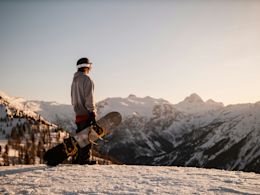
How to smash your winter sports dreams without freezing your finances
It’s possible to hit the slopes without your finances going off-piste.
7 min read
From the soaring slopes of the Alps to the powdery peaks of the Rockies, the cost of winter sports can send a chill down any budget-conscious spine. However, it's still possible to enjoy the thrilling rush of the slopes without breaking the bank. Here, we look at why skiing and snowboarding are so expensive — and explore how to live the winter sports dream without going broke. Between the price of equipment, insurance, and lessons to all the hidden costs that accompany staying in a remote, snowy resort, winter sports are rightly renowned for being expensive. However, for many people, the experience, the ambiance, the breathtaking views, and that special something in the air (it's not just the altitude) often justifies the price. Here's why a winter sports vacation often comes with such a high price tag.Winter sports gear has evolved into a blend of high-tech performance and comfort. We're talking cutting-edge technology, with skis and snowboards designed for optimal performance, comfort, and safety. These pieces of equipment are a marvel of engineering and come with a price tag to match. High-tech, high-contrast goggles, safety helmets, and Alpine Touring gear — all designed to make downhill adventures safe and sound — can quickly burn a significant hole in anyone's wallet.But for many, it's not enough to simply make it down a mountain anymore; every moment of the descent needs to be captured in high-definition. Action cameras like GoPros, fitness trackers, and even drones are becoming part of the standard winter sports kit, with one in five Brits taking a GoPro or activity tracker like a Fitbit when they go skiing. These gadgets add extra cost, transforming a ski holiday from a simple sports trip to a high-tech, expensive expedition.Winter sports can be a whirlwind of fun, but they do come with risks. And where there's risk, there's insurance. Being insured on the slopes is about being financially savvy just as much as it's about enjoying those snowy thrills. So, before whooshing down any slopes, it's best to have the protective buffer of a couple of insurance policies to help cushion any fall. Here are some to consider:Those prestigious slopes in the Alps or the Rockies aren't just sitting there for free. Access to these winter wonderlands often comes with hefty costs, including lift passes, ski resort fees, and, of course, the après-ski activities. Nestled in some of the most beautiful-yet-remote parts of the world, a winter sports resort can also be tricky to get to — with a price tag to match. That equals steep travel and accommodation expenses, which can add significantly to any winter holiday budget.Additionally, running a winter sports resort is an ambitious undertaking. There are lifts to upkeep, slopes to smooth, top-notch safety measures to maintain, and staff to pay. All of this comes at a cost that finds its way to the visitor's final bill. Plus, for many, accommodation in ski resorts isn't just about a roof and a bed. It's about enjoying that cozy, alpine vibe with a fireplace and maybe a hot tub to soak those tired après-ski muscles. These amenities, along with gourmet restaurants and exclusive bars, add to the high costs.In essence, ski resorts are expensive because they offer a unique blend of adventure, luxury, and experience in some of the most stunning and remote locations. The cost of maintaining the resort, providing first-class facilities and equipment, and creating a cozy, luxurious ambiance all contribute to the higher price tag, making them a fantastic but pricey option for those seeking a blend of thrill and comfort in the snow.And then, there are the less obvious costs. Ski and snowboarding lessons can be a sizable investment for those wanting to improve their skills. Lessons can vary in price, but they can cut significantly into any winter holiday budget. We're talking anywhere from a smaller sum for a group lesson to a more princely fee for private tutoring. Why the range? It boils down to a few frosty factors:Imagine carving through fresh snow or enjoying après-ski activities without the stress of overspending. Whether a seasoned snow enthusiast or a first-time skier, there are many smart financial choices any snow-sports enthusiast can make to get the most out of their winter holiday while still keeping their finances in check.Planning a winter holiday in advance is a smart move. Early bookings can lead to significant savings on flights and accommodation. Many ski resorts offer early-bird specials, including lodging and lift ticket discounts. It's also a great way to secure a spot during peak season without the premium price tag.Traveling during the off-peak season offers a more relaxed experience with fewer crowds and lower prices. The snow is still plentiful, but the queues for lifts and restaurants are shorter, which can make for a more enjoyable experience.Renting gear outside the resort or pre-booking online can offer substantial savings compared to on-spot rentals. Consider second-hand stores for quality gear at a fraction of the price, or borrow from friends. This can prevent racking up a large equipment bill at the resort's rental shop.Lesser-known ski destinations offer the same snowy experience at more budget-friendly prices. These spots often boast shorter lines and a more authentic local atmosphere, providing a different kind of charm for a fraction of the price. Borovets in Bulgaria, Vogel in Slovenia, Sauze d'Oulx in Italy, and Jasná Nízke Tatry in Slovakia are just some more budget-friendly resorts to consider.Staying in accommodation with kitchen facilities can significantly cut down on food expenses. This not only saves money but also offers a cozy, homely experience. Plus, it's a chance to bond over cooking after a day on the slopes.
Budgeting for a winter vacation is a breeze with N26. Intuitive features like N26 Spaces sub-accounts let you easily save towards your goals or allocate funds for specific expenses — like a holiday on the slopes. Insights help you organize your finances, track your spending, and set budgets. Plus, push notifications help you monitor your account activity in real-time, empowering you to care for your financial
Why winter sports are so expensive
Where tech meets comfort: the cost of equipment
The price of foresight
- Medical insurance: This one's a no-brainer. Medical insurance covers a wide spectrum of injuries, from a simple tumble to something more serious.
- Equipment insurance: Skis, snowboards, goggles — this gear isn't cheap. Equipment insurance covers loss, theft, or damage.
- Trip cancellation/interruption insurance: If plans change at the last minute or flights are canceled, this coverage can help recoup some of the losses.
- Liability Insurance: In case of accidentally colliding with someone else on the slopes, liability insurance covers any legal expenses or claims after the collision.
The eye-watering upkeep of winter sports resorts
A beginner's fee
- The cost of expertise. Instructors aren't just folks who love snow, they're trained professionals. Their expertise, certification, and years of experience add value to their teaching.
- The location factor. Lessons at high-end resorts or popular areas naturally cost more. It's the price for those breathtaking views and pristine slopes.
- The small-group advantage: Smaller groups or private lessons mean more personalized attention, but that exclusivity comes with a higher price tag.
How to enjoy a winter sports vacation without breaking the bank
The early bird advantage
Off-peak is chic
Know where to rent
Go off the beaten path
Self-cater
Your money at N26
BY N26Love your bank
Related Post
These might also interest youLIFESTYLECould AI help you manage your money?86% of people are open to using AI for financial planning, but is it safe? Learn how AI is already transforming money management, and discover the pros and cons.
4 min read
LIFESTYLEUnderstanding tariffsFrom higher grocery bills, pricier electronics, and stock market swings, tariffs can impact your wallet and your investments.
5 min read
LIFESTYLEDe-hyping the no-spend challengeThis extreme challenge promises to transform your finances, but is it really the game-changer it claims to be?
4 min read


